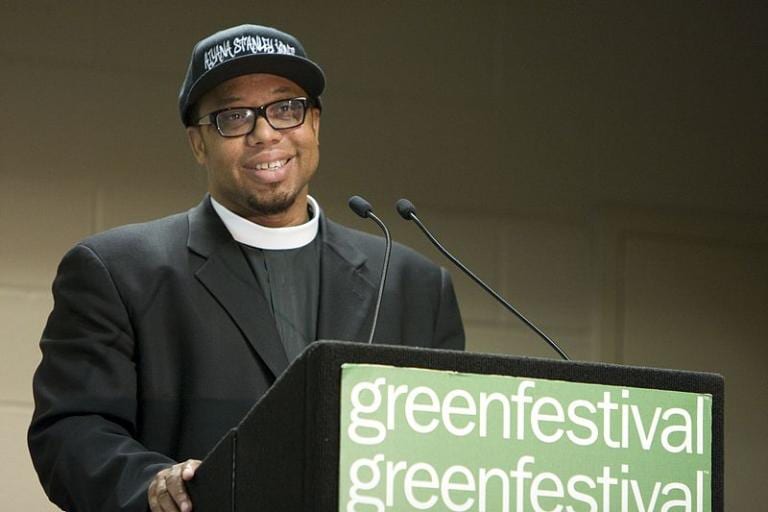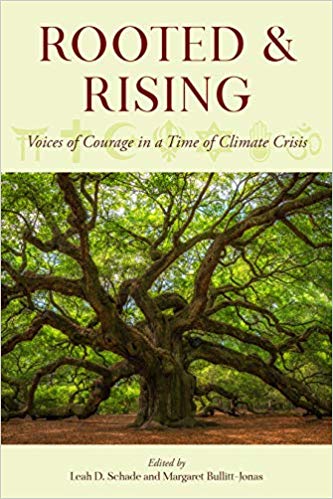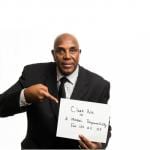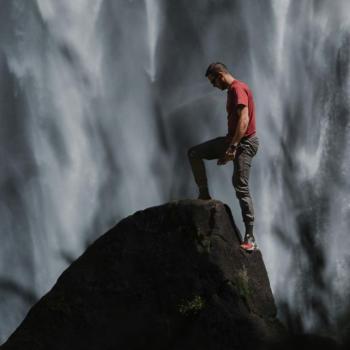This the second in a series of posts highlighting four authors from Rooted and Rising: Voices of Courage in a Time of Climate Crisis (Rowman & Littlefield, 2019) for a “green” Black History Month. Margaret Bullitt-Jonas interviewed Rev. Lennox Yearwood, Jr. on Martin Luther King, Jr. Day in 2019, after he attended a signing ceremony for the Clean Energy D.C. Omnibus Act. To date, this is the most aggressive legislation in any state to move to 100% renewable energy by 2032 – what Rev. Yearwood calls “the epitome of the Green New Deal.”

If Rev. Dr. Martin Luther King, Jr. were alive today, what do you think he would say about climate change?
There is no doubt that it would be added to his “isms” – racism, capitalism, militarism. His life ended with him fighting for environmental justice. Today we would see the issues facing the Memphis sanitation workers through the lens of environmental injustice, because they were exposed to toxins they didn’t know about. It’s worth noting that while many things led to his assassination, he was specifically going to Memphis to fight for the sanitation workers. That was an example of the environmental injustice they were facing at the time.
I have no doubt that from the standpoint of fighting for justice, Rev. Dr. King would have addressed climate change – that was how his life was trending at the end. He would have definitely taken on the corporate structures of the fossil fuel industry. He would have dealt with the issues of how communities of color in Chicago, and the rural communities in Alabama and in North Carolina are placed near fossil fuel production. Sixty-eight percent of people of color live within thirty miles of a coal-fired power plant. He would see that. He would say that climate change is a civil rights issue: that people have a right to clean air and water and the opportunity to thrive on a healthy planet.
The issue of lead poisoning in the water of Flint, Michigan, and the lead paint in Baltimore’s low-income housing would be right at the forefront, because he connected the dots so well. That was one of his gifts – to connect the dots in a masterful way.
How do you connect racial justice and climate change?
Race continues to be a trip-wire for the progressive climate movement. Every time race is brought up, we fall over as a movement: we don’t deal with that issue. There are a lot of reasons we don’t, but if we can just cut that wire, we can move on and get some things done. But as a movement, we’re not doing that.
Also, we have a siloed, segregated climate movement. We have a movement of those who are fighting for clear water and clean air, and those fighting to stop mountaintop removal. Then there are those who are trying to protect the Arctic and support the Indigenous peoples there, the Gwich’n. Still others are fighting to stop pipelines at Standing Rock, and so forth – but even in that part of the movement, there are many different groups and silos. That’s one of things we have to find a better way to handle. Our modern movement has been based on certain communities working separately on their own issues, and while there have been many successes, we’ve tackled issues within a silo.
Now we need a worldwide movement to break down the barriers between all of humanity. That’s why today’s movement is different from Dr. King’s. His mission was based on equality: how can we make people equal? Today’s movement is not only about equality – it’s also about existence. If this movement isn’t successful, the people on the planet won’t exist. Or they will exist in the horrible fashion we’re already beginning to see with wars (such as Syria), and with migrants seeking asylum because of droughts and crop failures in Central America…
As people of faith, we believe that this battle is not just ours: it’s also the Lord’s. We believe that together, we can achieve that. I have seen that. If we can figure these things out, we will be successful. We can cut the trip-wire of race. We can get out of the silos and become unified. Share our resources with one another. And draw on our faith to move forward.
Are you saying that there is a particular role that faith communities can play in this struggle?
Most definitely. Faith is a belief in something outside yourself. It’s not all on you. If it’s all on you, it can be overwhelming; you can become consumed with anxiety or fear and give up. When you know what we’re up against – when you’re hearing the reports about what’s going on with plastics in the oceans, or extreme wildfires, or what’s going on with the Trump administration rolling back basic safeguards to our clean water and air – then you need a faith to believe that there is something out there that will guide you and give you a wisdom to navigate, to do things that make sense. That’s what faith in its larger context can do.
Faith also has a role to play from an institutional standpoint. Men and women who lead faith traditions are important because they have a duty to address injustice. Also, they can provide places to meet and organize, just as they did with the abolitionist movement against slavery, the women’s movement, and other movements.
We are facing a global enemy. But we also have global faith traditions of all kinds, including Hindu, Christian, Muslim, Jewish, Buddhist, and many others. When we pull together, bringing our uniqueness, we are stronger. This is a time when we need faith traditions to share and connect.
Probably the most important thing is to believe that we were made for this moment. We were put on this planet at this time to fight this battle. That’s the most amazing gift we’ve been given by the Almighty: we are so needed. Our people and our gifts were put here at this time for this movement. As overwhelming as the climate crisis may be, we can do this if we all come together.
When you get discouraged and feel overwhelmed, where do you turn for strength?
Everybody is different, but I learn from Scripture that the battle is not only mine, but also the Lord’s. I am a soldier on this battlefield for justice. I work with young people, and while they don’t have the same institutional supports that others had before them, they are very spiritual and connect themselves in different ways. We’ve lost some, because they commit suicide or get discouraged – it’s easy see how that can happen. But I remind them: “This is not your battle alone.” You need to fight and to do all you can do, but you have to do this with connection to others and to your faith. You have to believe in something outside yourself.
You have to find your anchor. For me, it’s God and Christianity, but you’ve got to find your own anchor. If you don’t, you will be blown away. You can’t do activism without an anchor. You can’t do activism without faith or some form of belief – maybe a belief in the future, or in children. It’s great if you have a faith tradition, because there are pieces there that you can hold on to, such as a sacred text, poetry, music – all kinds of things that can inspire you. But you need to have something.
I’m anchored. I am anchored in my tradition as a person of color, knowing that the people before me had to fight so hard to overcome slavery, to overcome the injustice of Jim Crow, to overcome acts of voter suppression. I’m in a tradition of waking up with those who have already fought. And then, as a person of faith and a minister, I link to this tradition of faith so that whatever I do, my steps are ordered. I know that God is leading me on the right path of fighting for other people, not just for myself. I’m fighting for God’s children and for God’s planet. That allows me to continue and sometimes to do remarkable things with other people.

[Read the full interview with Rev. Lennox Yearwood in Rooted and Rising: Voices of Courage in a Time of Climate Crisis.]
Read also:
“Green” Black History Month: Spotlight on Rev. Dr. Gerald Durley
Rooted and Rising for Climate Action in 2020
Auschwitz is the Teacher: Holocaust Lessons for the Climate Crisis
Leah D. Schade is the Assistant Professor of Preaching and Worship at Lexington Theological Seminary in Kentucky and ordained in the ELCA. Dr. Schade does not speak for LTS or the ELCA; her opinions are her own. She is the author of Preaching in the Purple Zone: Ministry in the Red-Blue Divide (Rowman & Littlefield, 2019), Rooted and Rising: Voices of Courage in a Time of Climate Crisis (Rowman & Littlefield, 2019), and Creation-Crisis Preaching: Ecology, Theology, and the Pulpit (Chalice Press, 2015).
Leah’s latest book is a Lenten devotional centered on Creation: For the Beauty of the Earth (Chalice Press, 2020).
Twitter: @LeahSchade
Facebook: https://www.facebook.com/LeahDSchade/













